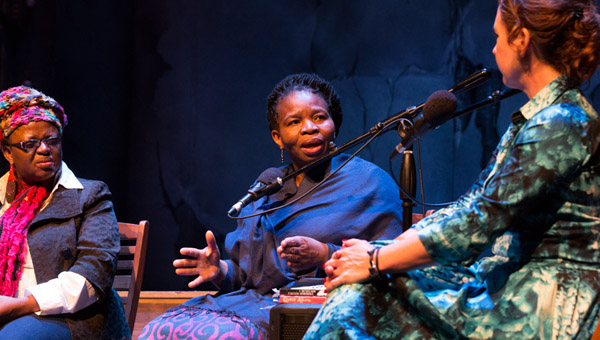50 Shades of Feminism, 7 September 2013, Fugard Theatre. A panel discussion with Pumla Gqola, Reneilwe Malatji, Fiona Snyckers and Khosi Xaba. Chaired by Margie Orford.
WANJIRU KOINANGE and MARIA GEUSTYN
Margie Orford describes the state of South African existence as being “black and white” as opposed to an, arguably, more favourable existence of “shades of grey”. While Orford’s statement initially suggests race, nuances extend to the complex and problematic thinking around clearly demarcated spaces, especially in a country which polices the bodies of all people. She highlights feminism as one of the many positions in which the divisions of class and race can be dissolved when women's bodies and sexuality are spoken about openly, and mentions as example the disruptive power inherent in EL James's Fifty Shades of Grey: “Women speaking about sexuality clearly is very powerful in the South African context.”
Orford proceeds to ask each of the panellists to describe what feminism means to them. For Pumla Gqola, feminism is a range of things that may not always sit comfortably together. Her feminism is a movement, an ideology, a refusal to be apologetic and a decision to live differently. It is self love. It is a challenge and a difficult space. Aware that “feminism” is “a range of things that doesn’t always sit together comfortably”, Gqola sees “feminism” in the relativity between an individual unapologetically “moving, thinking and feeling in their own skin” and the wider socio-political space. To Gqola, “feminism” means valuing the self, defence and freedom.
Khosi Xaba emphasises that “acts of feminism” manifest not only in opposition to patriarchy, but in different occasions of asserting the self, such as reacting to violence, sex-education, self-care and self-respect. It is the ability to say “I can tell the stories that I want to tell, from my perspective, from my situation”, and that, too, is a feminist act. When a young child questions why she is not allowed to play with her male siblings – that’s feminism. When nurses are taught how to conduct safe abortions so that women in their communities are able to resume control of their bodies – that’s feminism. When Khosi puts pen to paper and writes down stories of women doing great things, she assumes her glorious role of feminist.
Fiona Snyckers elaborates on this idea and highlights the fluidity of the term as encompassing “shades of grey” rather than rigid binaries. She reminds us that “feminism” cannot have only one definition as it means different things to different people in different social, political and cultural arenas. Therefore, “feminism” has different meanings in the personal space than the public space. Western feminism means something different to “feminism” in the Middle East. There needs to be as many descriptions of feminism as there are feminists and these definitions mustn’t be imposed on others. Fiona’s feminism is as much a public declaration as it is a personal statement.
Reneilwe Malatji confesses, to the delight of the full theatre, that she didn’t know she was a feminist until she was asked to be on the 50 Shades of Feminism panel. However, it is a label that she gladly accepts when she encourages women to look past dated ideas of what their roles are. Malatji highlights how, in certain rural areas of South African such as Limpopo, femininity is still inscribed with traditional prescriptions such as “motherhood”, “nurture” and “obedience” and that women are still pressured to conform.
The conversation turns to questions of “self-care” as acts of “political warfare” when Orford quotes Audre Lorde: “Caring for myself is not self-indulgence, it is self-preservation and that is an act of political warfare”. Speaking of her acclaim for Lorde, Gqola says that Lorde is able to “write powerfully about the meeting places of how revolutionary the orientation of black consciousness is in the world, and how revolutionary a queer feminist politic is in the world. They say unequivocally white supremacy and patriarchy are violent systems and we do not need to be apologetic in opposing to them.” To Gqola, Lorde’s statement contains the assertion of the “I” in resisting violent systems and remains unapologetic to “self-love” within these revolutionary acts. Xaba underlines the importance of “self-love” as resistance to the “othering” nature of dominant ideologies, as saying “we are normal too, and this is what’s normal for us”.
As the discussion winds down, questions from the floor probe the difficulties of “self-care” and their political nature, when women are forced to forego financial prosperity when they fall ill, in order to “take care of themselves”. This leads to a question regarding the necessity for affirmative action, which draws conflicting responses from the panellists on the unapologetic need for it. A keen audience member asks how one deals with women who refuse to be feminists. Implausible though it may seem, it appears that there are still women who refuse to acknowledge that women all over the world continue to be margnialised, and who wouldn't mind being passed over for opportunities because of their gender. Who are these women, whose hearts don't bleed each time a girl is raped and a woman abused?
Fiona Snyckers closes the session as she brings the afternoon’s discussion full circle in her reply to a remark on the stereotypical “combative quality” associated with feminists: “I know many modern young women who resist being called feminists”, as the term is frequently associated with aggression. “Yet you need to realise that calling yourself a-political, or a woman who is not a feminist, is a political statement, and quite an aggressive one.” More importantly, Snyckers highlights how statements like these betray a “profound lack of self-awareness”. She proposes, rather, that “feminism” should invoke “sensitive inclusions” of different human conditions, or perhaps, shades of grey as opposed to clear spectrums of colour.
 SLiPStellenbosch Literary Project
SLiPStellenbosch Literary Project 